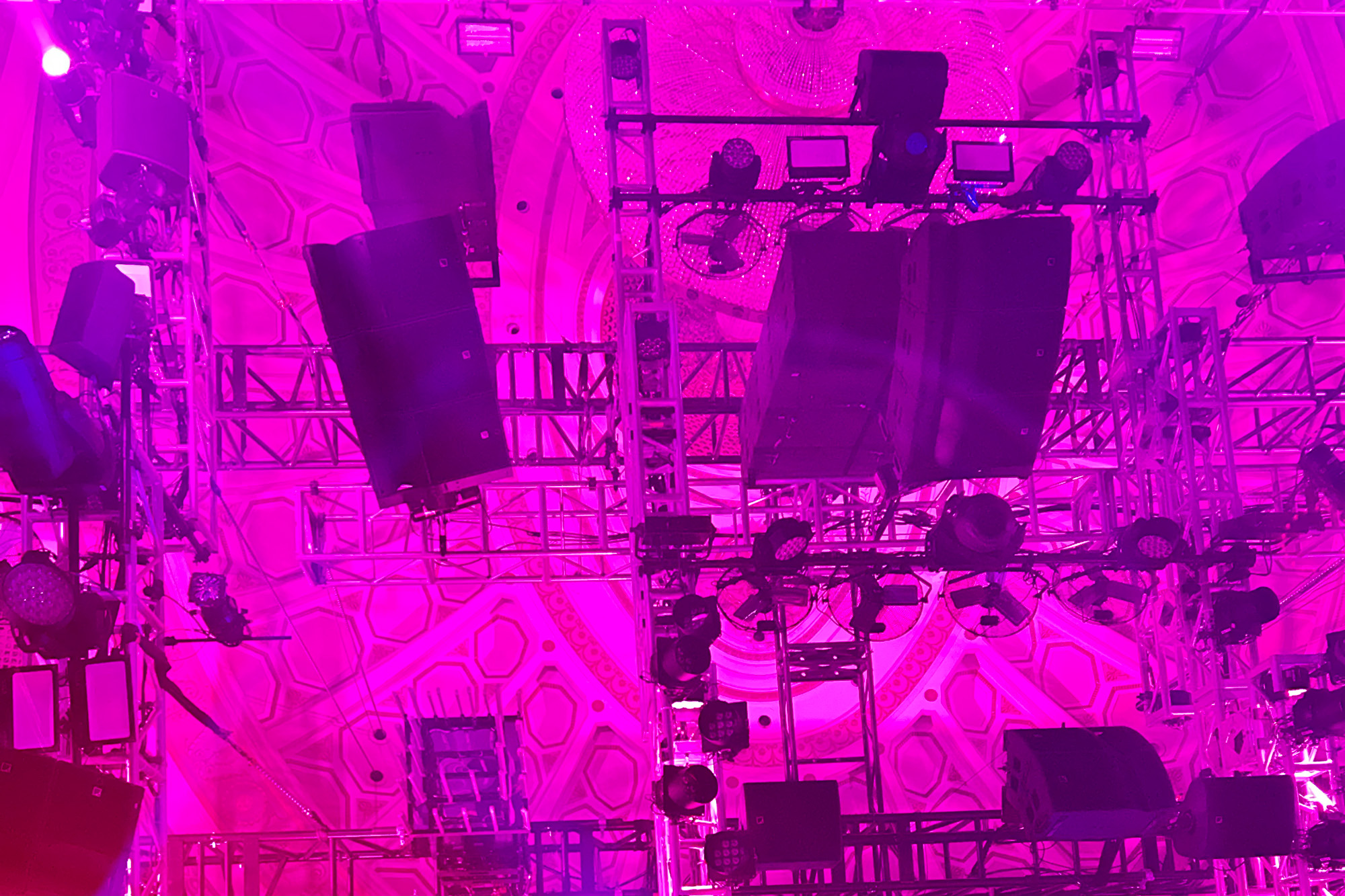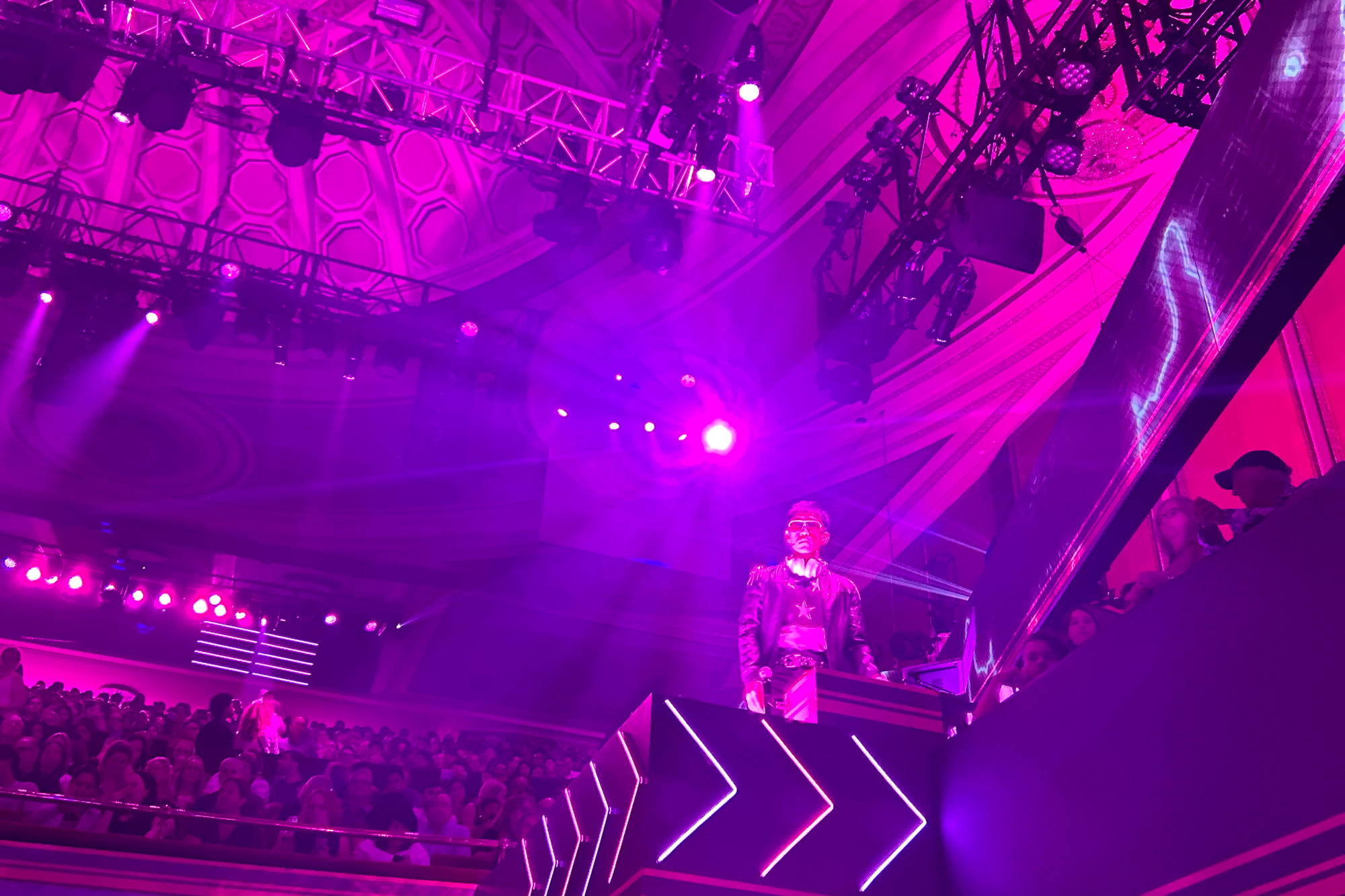Disco was once a great unifier. This is before disco sucked in the mainstream, way before the cries of “Disco sucks!” Put aside the velvet ropes and Halston gowns, the white suits and whiter lines, the barriers to entry and roadblocks to appreciation. Disco in its most undefiled form—blending danceable R&B and marginalized cultures—was once able to do something no single group or government could: bring people together.
In summer 2023, a disco of sorts brought me to Broadway. I attended a preview performance of “Here Lies Love”—a concept musical by David Byrne and Norman “Fatboy Slim” Cook about the rise and fall of Imelda Marcos, first lady of the Philippines from 1965 to 1986. While no one familiar with the ticket prices for an average Broadway show would say it’s as populist a night out as clubbing, theater, like disco, does bring people together in commonality. Musicals, especially, attempt to build an atmosphere of togetherness where everyone in the room is waiting to see where vibrations would have them go. And “Here Lies Love” is notable as the first Broadway production to direct those vibrations through an immersive audio installation featuring multiple zones of L-Acoustics speakers with L-ISA software for 3-D control.
Billy Bustamante, Matthew Murphy and Evan Zimmerman (2023)
“Here Lies Love” is set in the fictional Club Millennium, which was set in the real Broadway Theatre. As for the sets, they introduced their own challenges. To emphasize the dance club environment, orchestra seats were removed and a pit for the audience plus modular rotating catwalks for actors extended up to the traditional proscenium. In addition, elevated galleries along the sides of the dancefloor were installed, with a raised “VIP Lounge” constructed in front of the traditional front and rear mezzanine seating.
With actors singing from positions throughout the audience, what was needed was a way to escape the tyranny of stereo—a way to provide theatre-wide coverage, naturally track the action, and use sonic cues much the way lighting has directed the audience’s attention for decades. The solution: more than 220 speakers separated into six audio zones, all choreographed by object-based processing to support small moments that build big atmosphere.
So why L-Acoustics? It began with the French loudspeaker designer’s voicing, according to Cody Spencer, sound designer of “Here Lies Love” alongside collaborator M.L. Dogg. Having worked with live music venues, such as tuning the system at Brooklyn Steel, Spencer was familiar with L-Acoustics, which pioneered a line source array in the early 1990s and helped popularize these now-ubiquitous hanging speaker chains for touring bands, festivals, and Las Vegas residencies, etc. Sure, a properly flown line array can distribute sound farther. But, according to Spencer, who shared a few quick reflections following the preview, an L-Acoustics array can also disperse sound more coherently. This is because the crossovers—the points at which frequencies are split between speaker drivers—are set in a way that doesn’t disrupt what you need for intelligibility as actors sing with and at each other. Theater is a place where you really need things to be flat, feedback-free, and in phase to avoid getting overwhelmed by consonants and articulation.
This house sound allowed technology providers PRG North America to blend speakers from L-Acoustic’s long-throw KARA series, medium-throw A series, and short-throw X series, plus numerous sub bins for low-end reinforcement. This density of full-spectrum and point-source speakers allowed for a scalable soundtrack—up to 96 inputs, mixing the automation and real-time dB manipulation of musical scenes and live mics pushed, positioned, and summed through a DiGiCo SD7T Quantum console. All the thrills and fills were fed via MADI conversion to and from L-ISA and into 50 LA4X amps, each pushing 4x1000W channels on a Milan-AVB network for routing, mapping, and monitoring the matrix.

Tony Ware
Another thing Spencer became very familiar with through traditional venue sound was the need for redundancy. Because what good are subtleties or surges if the system goes down? With this in mind, “Here Lies Love” ran multiple L-ISA 3.0 processors to assure 100 percent reliability: one for the spatial mix, showering the floor and bleeding into a more mono presentation to the galleries; another in tandem for the frontal L/C/R mix, which went to the VIP and mezzanines; and then a third, hot-swappable backup in case either primary system went down.
Of course, it’s one thing to think every seat will be able to experience every moment—intimate to expansive—and quite another to dial every element in. It’s especially challenging when the slightest shift in set design and reflective surfaces could mean drastically recalibrating the sonic content. Keeping interactions in sync was aided by having the proprietary L-Acoustics prediction tool Soundvision in the production flow. This virtualization software allowed Spencer insight into what might happen if a speaker moved a foot this way or that to compensate for architecture or artistry. Simulating reality allowed for a lot of pre-cues and pre-delays to be reviewed before the preview.
What the bespoke L-Acoustics/L-ISA installation ultimately allowed was expanding what was once a narrow sweet spot. And more directionality trumps more volume as a high-impact means of adding depth. A little excess > a lot of overdrive. After all, packing a room with the perfect balance of people, music, and energy fueled disco at its most spiritual.

Tony Ware
“Here Lies Love” closed in November 2023, but it opened the door for additional immersive possibilities. In April 2024, “The Outsiders,” a new musical based on the novel by S.E. Hinton and film by Francis Ford Coppola, opened at the Bernard B. Jacobs Theatre. In June 2024, almost one year after my encounter with the L-Acoustics/L-ISA installation, “The Outsiders” won multiple awards at the 77th Tony Awards, including a Best Sound Design of a Musical for Spencer.
While I haven’t seen “The Outsiders,” it’s safe to assume from the accolades and reactions that sound localization and an encompassing audio-as-supporting-character approach remain in full effect. And it feels equally plausible that you’ll be hearing more about what you’ll be hearing more of as the infrastructure for live engagements and personalized experiences continues to evolve. You’ll certainly be hearing more about L-Acoustics’ unified vision as the company celebrates its 40th year; check in with us this fall as we encounter the company’s latest Creations.





















Discussion about this post